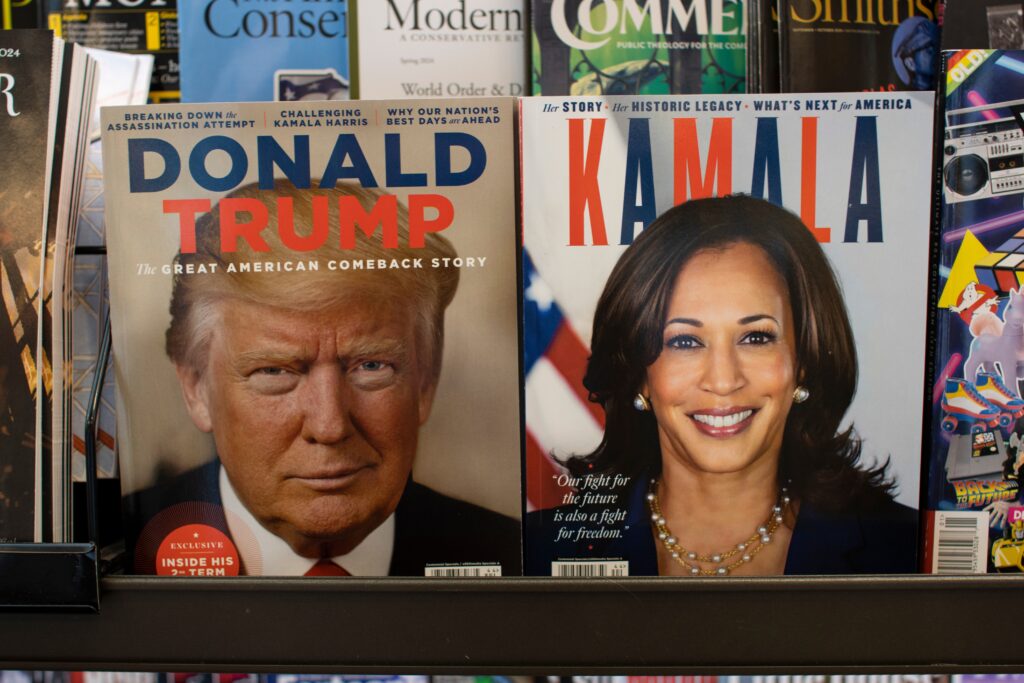FCC EQUAL TIME VIOLATION

DONALD J. TRUMP AND KAMALA HARRIS MAGAZINE COVERS FOR PRESIDENTIAL RACE 2024
BY SNN.BZ COMPLIANCE OFFICER
The Federal Communications Commission (FCC) has a rule known as the “equal time” provision, which is part of the Communications Act of 1934. This rule mandates that broadcast stations must provide equal opportunities to all legally qualified political candidates for any public office if they have allowed any person running for that office to use the station. The intent behind this rule is to ensure that no candidate is given an unfair advantage over another in terms of media exposure, thereby promoting a fair and balanced electoral process.
The history of the FCC’s equal time rule dates back to the early days of radio broadcasting. It was first established under the Radio Act of 1927 and later incorporated into the Communications Act of 1934. The rule was designed to prevent broadcasters from favoring one candidate over another, ensuring that all candidates had a fair chance to communicate their messages to the public. Over the years, the rule has been refined and clarified to address the evolving landscape of media and politics.
There have been several notable instances where the equal time rule has been openly violated. One such case occurred in 1960 when a broadcaster gave extensive coverage to John F. Kennedy’s campaign but did not provide equal time to his opponent, Richard Nixon. The FCC intervened, and the broadcaster was required to offer equal time to Nixon. Another instance was in 1980 when Ronald Reagan’s campaign received more airtime than his opponents, leading to similar FCC action.
When violations of the equal time rule occur, the FCC has the authority to impose sanctions on the offending broadcaster. These sanctions can range from fines to more severe penalties such as the revocation of the broadcaster’s license. The severity of the punishment often depends on the nature and extent of the violation. In some cases, the sanctions have been significant enough to deter future violations, but there have also been instances where the penalties were seen as insufficient to prevent recurrence.
In the case of Kamala Harris’s recent appearance on “Saturday Night Live” (SNL), FCC Commissioner Brendan Carr claimed that it violated the equal time rule. According to Carr, Harris’s appearance was a clear attempt to evade the rule by giving her an unfair advantage in media exposure just before the election. However, the FCC has not yet made an official determination regarding this specific incident, and it remains to be seen whether any formal complaints will be filed or actions taken
If it is determined that Harris’s appearance on SNL did indeed violate the equal time rule, the primary responsibility for the violation would lie with the broadcaster, NBC, rather than Harris herself. The FCC’s enforcement actions would likely focus on NBC, potentially requiring them to offer equal time to other candidates or face penalties. As for Harris, while she may face public criticism, it is unlikely that she would face legal consequences directly related to the FCC rule.
Here at SNN.BZ we do not have a POLITICAL category and we do not offer opinions recommending one side of the aisle or the other.
The enforcement of the equal time rule is crucial for maintaining the integrity of the electoral process unfortunately, the Harris Campaign has openly violated it.





 Afrikaans
Afrikaans Albanian
Albanian Amharic
Amharic Arabic
Arabic Armenian
Armenian Azerbaijani
Azerbaijani Basque
Basque Belarusian
Belarusian Bengali
Bengali Bosnian
Bosnian Bulgarian
Bulgarian Catalan
Catalan Cebuano
Cebuano Chinese (Simplified)
Chinese (Simplified) Chinese (Traditional)
Chinese (Traditional) Corsican
Corsican Croatian
Croatian Czech
Czech Danish
Danish Dutch
Dutch Esperanto
Esperanto Estonian
Estonian Filipino
Filipino Finnish
Finnish French
French Frisian
Frisian Galician
Galician Georgian
Georgian German
German Greek
Greek Gujarati
Gujarati Haitian Creole
Haitian Creole Hausa
Hausa Hawaiian
Hawaiian Hebrew
Hebrew Hindi
Hindi Hmong
Hmong Hungarian
Hungarian Icelandic
Icelandic Indonesian
Indonesian Irish
Irish Italian
Italian Japanese
Japanese Javanese
Javanese Kannada
Kannada Kazakh
Kazakh Khmer
Khmer Korean
Korean Kyrgyz
Kyrgyz Lao
Lao Latin
Latin Latvian
Latvian Lithuanian
Lithuanian Luxembourgish
Luxembourgish Macedonian
Macedonian Malagasy
Malagasy Malay
Malay Malayalam
Malayalam Maltese
Maltese Maori
Maori Marathi
Marathi Mongolian
Mongolian Myanmar (Burmese)
Myanmar (Burmese) Nepali
Nepali Norwegian
Norwegian Pashto
Pashto Persian
Persian Polish
Polish Portuguese
Portuguese Punjabi
Punjabi Romanian
Romanian Russian
Russian Samoan
Samoan Scottish Gaelic
Scottish Gaelic Serbian
Serbian Sesotho
Sesotho Shona
Shona Sindhi
Sindhi Sinhala
Sinhala Slovak
Slovak Slovenian
Slovenian Somali
Somali Spanish
Spanish Sundanese
Sundanese Swahili
Swahili Swedish
Swedish Tajik
Tajik Tamil
Tamil Telugu
Telugu Thai
Thai Turkish
Turkish Ukrainian
Ukrainian Urdu
Urdu Uzbek
Uzbek Vietnamese
Vietnamese Welsh
Welsh Yiddish
Yiddish Yoruba
Yoruba Zulu
Zulu